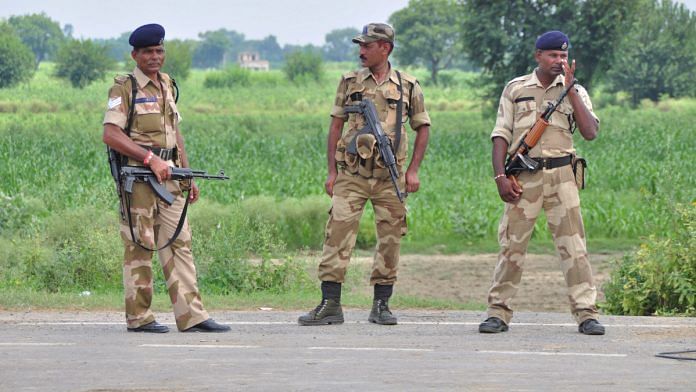New Delhi: In the last over two years, West Bengal has sent the maximum number of requests to Central Industrial Security Force (CISF) to guard its private industries, but all of them were rejected as “unnecessary”, ThePrint has learnt.
According to data available with the Ministry of Home Affairs (MHA), of the total 84 requests received in the last over two years, a little more than 50 per cent came from West Bengal.
The CISF, an armed paramilitary police force under the home ministry, guards critical infrastructure of the country, including airports, atomic energy plants, space installations as well as giant corporate industries such as Reliance, Tata and Infosys, among others.
At present, the force has been deployed across 59 major airports, Delhi Metro and several sensitive areas in Jammu & Kashmir and in northeastern states, apart from the above mentioned installations and industries.
“We receive requests from private industry owners on a regular basis. However, people need to understand that the CISF is not a private security company, but an armed force and there is a procedure that needs to be followed before the (security) cover is approved,” an MHA official asserted.
“Not every industry can get the force to guard its premises,” he added.
Currently, only nine private companies across the country have been given CISF cover — Electronics City in Bengaluru, Hotel Terminal 1C CSIA in Mumbai, Infosys Technologies Ltd in Mysuru, Pune and Bengaluru, Patanjali Food & Herbal Park in Haridwar, Reliance Corporate IT Park in Navi Mumbai, Reliance Refinery & Petrochemical in Jamnagar, and Tata Steel in Kalinganagar.
How a request for CISF cover is approved
Explaining the procedure, an MHA official said that after a request from a company is received, it is first scrutinised by the CISF. The file then goes to the ministry.
“A four-member committee is then constituted, which includes members from the industry that has requested for the security and two officials — each from the ministry and the CISF. A field visit of the industry is then carried out to see if it really requires security,” the official said.
“The reason based on which the security has been sought are also looked into. The committee then submits a report to MHA with suggestions, which is then reviewed and accordingly approved or rejected.”
If the security is approved, the strength of CISF personnel required for the duty is then decided upon. The company engaging the CISF for its security is required to pay the salaries of the personnel and also arrange for their accommodation.
“They, however, do not pay the personnel directly. The government pays the salaries, which are then reimbursed by the private industries,” the official explained.
Also read: No takers for women’s quota in CRPF, CISF or BSF as forces strive to fulfil Modi govt plan
Most requests for security cover came from power sector
Another MHA official told ThePrint that most requests for CISF security have come from the power sector.
“It appears to be the most vulnerable of all the industries because in the last two years, we have received most requests from the power sector,” the official said.
“The reason for this is the expensive infrastructure they build, including power grids and plants. Also, they have several other projects running simultaneously, involving solar and wind power generation. So they seek the best security cover,” the official added.
‘Frivolous requests’
Mostly, though, the requests are “frivolous” in nature, a third MHA official told ThePrint, adding that they have even received requests from industries manufacturing automobile spare parts, or just nuts and bolts.
“Once we got a call from a businessman in Haryana asking for 15 CISF men to guard his industry. We had to explain to him that it is not a private security agency, but an armed force and one has to go through lengthy scrutiny to get the security,” the official said.
“The man, however, was adamant and said he has seen the security at airports and some industries, and was keen to have it for whatever money it will cost.”
The official said they have to deal strictly with such requests.
Whenever there is a law and order situation in a state, the influx of requests for CISF cover sees a surge, he added.
“A businessman from Haryana called during the Jat agitation. He wanted us to guard his industry as he was scared that it may be attacked and he may suffer losses,” he said.
“When the riots broke out in Muzaffarnagar (in 2013), there was an influx of requests from UP, including from Shamli and Saharanpur,” the official added.
Also read: How CISF transformed itself into a revenue-earning modern security force




Sir mera hight 1/69 cm hota h phir mujhe kaise chhat Diya jb ki mai SC mai aata hu sir
I sir i am kanai salia mara cisf ka 1cm hight kam ho gaya ha isliya reject kar diya sri muja l am very sad …???
Yes sir I want job in CISF
Your hamble request sir